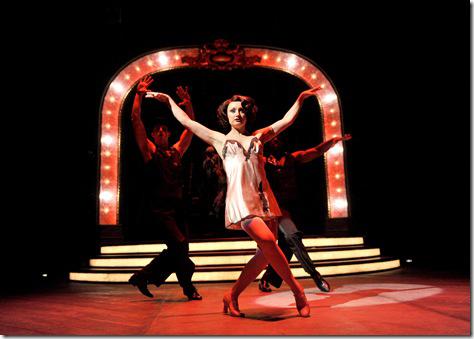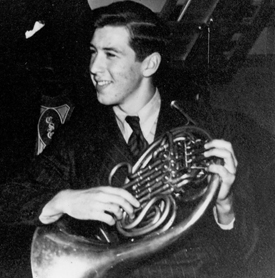Sister Rosetta Tharpe sings “Up Above My Head” with the Olivet Institutional Baptist Church Choir:
Archives for October 2011
TT: Almanac
“Only man can be absurd: for only man can be dignified.”
G.K. Chesterton, “Spiritualism”
TT: The Follies of our dreams
In today’s Wall Street Journal I report on two shows, Chicago Shakespeare’s revival of Follies and David Henry Hwang’s Chinglish, which has just transferred to Broadway. In both cases, the news is good. Here’s an excerpt.
* * *
When “Follies” first opened in 1971, it was the most expensive musical in the history of Broadway. Even now it’s usually done on the grandest scale possible. The current Broadway revival of “Follies” may not have any falling chandeliers or flying helicopters, but it’s being performed on the proscenium stage of the 1,615-seat Marquis Theatre, one of Broadway’s largest houses, and it’s more than big enough to fit.
 The problem with this approach to “Follies” is that it’s not so much a traditional musical as a memory play, one in which two unhappily married middle-aged couples who are haunted by the ghosts of their younger selves revisit the past in the hope of coming to terms with the present. What makes it a musical is that Phyllis and Sally, the stars of “Follies,” are retired Broadway gypsies. They’ve brought Buddy and Ben, their husbands, to a reunion of the chorus girls from the Weissmann Follies, who sing and dance one last time on the crumbling stage of the soon-to-be-demolished theater where they performed together decades ago. This ingenious premise opens the door to mounting “Follies” on a luxuriantly large scale, but it doesn’t have to be done that way, and Chicago Shakespeare’s darkly poignant new production, directed by Gary Griffin, shows how “Follies” can profit from being presented in a more intimate manner.
The problem with this approach to “Follies” is that it’s not so much a traditional musical as a memory play, one in which two unhappily married middle-aged couples who are haunted by the ghosts of their younger selves revisit the past in the hope of coming to terms with the present. What makes it a musical is that Phyllis and Sally, the stars of “Follies,” are retired Broadway gypsies. They’ve brought Buddy and Ben, their husbands, to a reunion of the chorus girls from the Weissmann Follies, who sing and dance one last time on the crumbling stage of the soon-to-be-demolished theater where they performed together decades ago. This ingenious premise opens the door to mounting “Follies” on a luxuriantly large scale, but it doesn’t have to be done that way, and Chicago Shakespeare’s darkly poignant new production, directed by Gary Griffin, shows how “Follies” can profit from being presented in a more intimate manner.
Mr. Griffin’s version takes place in the company’s 500-seat mainstage theater, an Elizabethan-style courtyard house whose deep thrust stage puts you mere feet away from the performers, and Kevin Depinet’s reversed-perspective set creates the illusion that you’re seeing the show from backstage, with the 12-piece orchestra seated in tiers on the far side of the proscenium. This allows Mr. Griffin and Alex Sanchez, the choreographer, to stage the show’s musical numbers so that the Weissmann Girls seem to be performing for one another rather than for the audience. It’s as if we’re eavesdropping on their final reunion–and on the fast-fraying marriages around which the show is woven….
If, like me, you’ve dreamed of a “Follies” that eschews fancy frills and cuts straight to the heart of the matter, you don’t have to wait any longer. It’s here, and it’s great….
 David Henry Hwang, the author of “M. Butterfly,” is back on Broadway with “Chinglish,” which originated at Chicago’s Goodman Theatre. Mr. Hwang’s new play is a fluffy bilingual romcom that makes clever use of projected supertitles. In the first act we meet Daniel (Gary Wilmes), an Ohio businessman who comes to China hoping to make a profitable deal, blunders into a thicket of cultural confusion and falls hard for Xi Yan (Jennifer Lim), a married government official who is looking for something more than a fling but less than a divorce. “Chinglish” is a one-joke show, the joke being that none of the Chinese characters, the translators very much included, can speak English well enough to make themselves fully understood to Daniel (“I appreciate the frank American style” becomes “He enjoys your rudeness”). The second act is deeper in tone, enough so that you wish the first act had taken more chances. But Mr. Hwang wrings the most out of his one joke…
David Henry Hwang, the author of “M. Butterfly,” is back on Broadway with “Chinglish,” which originated at Chicago’s Goodman Theatre. Mr. Hwang’s new play is a fluffy bilingual romcom that makes clever use of projected supertitles. In the first act we meet Daniel (Gary Wilmes), an Ohio businessman who comes to China hoping to make a profitable deal, blunders into a thicket of cultural confusion and falls hard for Xi Yan (Jennifer Lim), a married government official who is looking for something more than a fling but less than a divorce. “Chinglish” is a one-joke show, the joke being that none of the Chinese characters, the translators very much included, can speak English well enough to make themselves fully understood to Daniel (“I appreciate the frank American style” becomes “He enjoys your rudeness”). The second act is deeper in tone, enough so that you wish the first act had taken more chances. But Mr. Hwang wrings the most out of his one joke…
This is Ms. Lim’s Broadway debut, and she’s a knockout, tough, smart and sexy….
* * *
Read the whole thing here.
TT: Why Fantasia mattered
Gunther Schuller’s newly published autobiography is the occasion for my “Sightings” column in today’s Wall Street Journal. Here’s an excerpt.
* * *
If you’d done a quarter of what Gunther Schuller has done in his lifetime, I’d want to read your memoirs, too. Mr. Schuller, who turns 86 next month, is a much-admired classical composer and conductor and a distinguished jazz scholar. Before that, he was the principal horn player of the Metropolitan Opera Orchestra. He is the only musician in the world who can claim to have played with Maria Callas, Miles Davis, Ethel Merman, Frank Sinatra, Igor Stravinsky and Arturo Toscanini. In “Gunther Schuller: A Life in Pursuit of Music and Beauty,” just out from the University of Rochester Press, he talks about all this and much, much, much more. Mr. Schuller’s autobiography, which takes him up to 1957, is a 654-page monster that appears not to have been edited by anyone, least of all the author. It’s garrulous, unselective and riddled with errors (somebody really needs to tell Mr. Schuller how to spell Ralph Vaughan Williams’ name). I don’t care. I couldn’t put it down, and I can’t wait until he finishes the second volume.
 Paradoxical as it may sound, it is Mr. Schuller’s lack of discrimination that helps to make “Gunther Schuller” so compulsively readable. Yes, he’s led an unusually varied life, and no, we don’t need to hear about all of it, or even most of it. But it is precisely because he thinks otherwise that Mr. Schuller has inadvertently given us what amounts to a cultural history of America in the ’40s and ’50s, viewed through the prism of his personal experience. If you’re not especially interested in what he’s talking about at any given moment, all you have to do is turn the page.
Paradoxical as it may sound, it is Mr. Schuller’s lack of discrimination that helps to make “Gunther Schuller” so compulsively readable. Yes, he’s led an unusually varied life, and no, we don’t need to hear about all of it, or even most of it. But it is precisely because he thinks otherwise that Mr. Schuller has inadvertently given us what amounts to a cultural history of America in the ’40s and ’50s, viewed through the prism of his personal experience. If you’re not especially interested in what he’s talking about at any given moment, all you have to do is turn the page.
I was especially interested in what Mr. Schuller had to say about “Fantasia,” Walt Disney’s 1940 animated feature film about classical music, which he saw for the first time when he was 14: “That film masterpiece truly changed my life, particularly its Stravinsky ‘Rite of Spring’ sequence, which, as far as I can remember, was the first time I heard that remarkable music. It completely bowled me over. I knew then and there that I had to be a composer.”
Needless to say, snobs of all kinds have long taken a dim view of “Fantasia,” with its dancing mushrooms and cavorting hippos. Not so Gunther Schuller: “I hope [Stravinsky] appreciated that hundreds–perhaps thousands–of musicians were turned onto ‘The Rite of Spring’ (and by implication lots of other modern music) through ‘Fantasia,’ musicians who might otherwise never have heard the work, or at least not until many years later.”
I’m with Mr. Schuller. Hollywood used to do a lot to introduce youthful moviegoers to the joys of classical music….
* * *
Read the whole thing here.
The Rite of Spring sequence from Fantasia. Stravinsky’s score is performed by Leopold Stokowski and the Philadelphia Orchestra:
TT: Almanac
“Mere abuse is no criticism.”
P.G. Wodehouse, Quick Service
TT: So you want to see a show?
Here’s my list of recommended Broadway, off-Broadway, and out-of-town shows, updated weekly. In all cases, I gave these shows favorable reviews (if sometimes qualifiedly so) in The Wall Street Journal when they opened. For more information, click on the title.
BROADWAY:
• Anything Goes (musical, G/PG-13, mildly adult subject matter that will be unintelligible to children, closes Apr. 29, most performances sold out last week, reviewed here)
• Follies (musical, PG-13, adult subject matter, closes Jan. 22, reviewed here)
• How to Succeed in Business Without Really Trying (musical, G/PG-13, perfectly fine for children whose parents aren’t actively prudish, most performances sold out last week, reviewed here)
• Man and Boy (drama, PG-13, closes Nov. 27, most performances sold out last week, reviewed here)
OFF BROADWAY:
• The Agony and the Ecstasy of Steve Jobs (monologue, PG-13, extended through Dec. 4, reviewed here)
• Avenue Q (musical, R, adult subject matter and one show-stopping scene of puppet-on-puppet sex, reviewed here)
• The Fantasticks (musical, G, suitable for children capable of enjoying a love story, reviewed here)
• Million Dollar Quartet (jukebox musical, G, off-Broadway remounting of Broadway production, original run reviewed here)
IN GLENCOE, ILLINOIS:
• The Real Thing (serious comedy, PG-13, extended through Dec. 4, reviewed here)
CLOSING NEXT WEEK OFF BROADWAY:
• We Live Here (drama, PG-13, closes Nov. 6, reviewed here)
CLOSING NEXT WEEK IN ASHLAND, OREGON:
• August: Osage County (drama, PG-13/R, closes Nov. 5, reviewed here)
• Julius Caesar (Shakespeare, PG-13, closes Nov. 6, reviewed here)
• Measure for Measure (Shakespeare, PG-13, closes Nov. 6, reviewed here)
TT: Almanac
“Dialogue should be logical, but it doesn’t have to be banal.”
Lanford Wilson (quoted in the Cincinnati Inquirer, May 6, 2001)
TT: Snapshot
The original hour-long TV version of Reginald Rose’s Twelve Angry Men, starring Robert Cummings, directed by Franklin Schaffner, and telecast live on Studio One in 1954:
(This is the latest in a weekly series of arts-related videos that appear in this space each Wednesday.)
